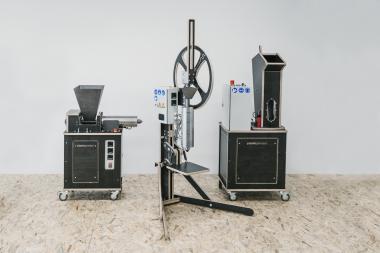EREMA Group acquires stake in start-up company plasticpreneur®
As of 30 May 2022, EREMA Group GmbH acquired 19.8 percent of plasticpreneur® gmbh. plasticpreneur® is an Austrian start-up company founded two years ago that manufactures at its production site in Klagenfurt recycling solutions for plastic waste that are mobile and can be operated without prior knowledge. The machine portfolio covers the recycling process and the production of new end-products. Due to it´s wide range of applications, it is in demand both in the Global South and in industrialised countries.
In the two years since the company was founded, plasticpreneur® has already sold 330 machines to customers in over 70 countries on all continents. In addition, they have made over 750 application-specific moulds, many of them custom-built to comply with individual customer specifications.
While plastics recycling has gained enormous momentum in the industrialised countries, more remote and poorer regions of the world have hardly benefited from high-tech solutions for industrial recycling processes so far. They are held back by a lack of infrastructure and know-how. That is why waste is often incinerated or disposed of in landfills, rivers and the surrounding environment. "Our mission - Another life for plastic, because we care - is also aimed at supporting these regions with solutions for plastic recycling, and with plasticpreneur® we have found the ideal partner for this," says Manfred Hackl, CEO EREMA Group.
The start-up company's machines can process HDPE, PP, PS, LDPE, PLA, AB and TPU separately. Their product range includes a shredder, injection moulding unit, extruder unit for the production of end products, air filters as well as custom-built moulds. "For our machines to be used in regions with little infrastructure, they must be easy to operate without prior knowledge. The fact that we also develop end-product solutions needed locally makes our range of services particularly attractive here," explains Sören Lex, CEO and co-founder of plasticpreneur®. As soon as recycling also becomes a source of income for the operators, they become entrepreneurs. That explains the name of the start-up, a word created from "plastic" and "entrepreneur". plasticpreneur® customers in these countries include e.g. social enterprises and operators of refugee camps, where everyday consumer goods - from clothes pegs and school supplies to toys and fence posts - are produced and sold using plastic waste. This means that the added value stays local.
The demand for plasticpreneur® machines is also increasing in industrialised countries. On the one hand by educational institutions and organisations that use them to raise awareness of the need for a circular economy in workshops and to give pupils as well as adults a better understanding of plastic recycling. On the other hand by customers who are developing new end-products for plastic waste together with plasticpreneur®. Because the machines are so easy to operate they enable a low-theshold use of recycled plastics in product development processes, starting from generating prototypes to launchin small series production. Small companies, product designers and developers therefore are another steadily growing customer segment.
EREMA Group GmbH









